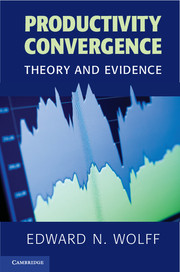Book contents
- Frontmatter
- Contents
- Acknowledgments
- 1 Introduction
- 2 An Overview of Modern Growth Theory
- 3 The Measurement and Estimation of Productivity Growth
- 4 Long-Term Record among the Advanced Industrial Countries
- 5 Postwar Record on Productivity Performance on the Aggregate Level among the Advanced Industrial Countries
- 6 Further Details on the Role of Education and Technology in the Productivity Performance among the Advanced Industrial Countries
- 7 Productivity Performance on the Industry Level among the Advanced Industrial Countries
- 8 The Productivity Slowdown
- 9 Postwar Economic Performance among Countries of the World
- 10 Recapitulation and Future Prospects for Growth
- Bibliography
- Index
2 - An Overview of Modern Growth Theory
Published online by Cambridge University Press: 05 June 2014
- Frontmatter
- Contents
- Acknowledgments
- 1 Introduction
- 2 An Overview of Modern Growth Theory
- 3 The Measurement and Estimation of Productivity Growth
- 4 Long-Term Record among the Advanced Industrial Countries
- 5 Postwar Record on Productivity Performance on the Aggregate Level among the Advanced Industrial Countries
- 6 Further Details on the Role of Education and Technology in the Productivity Performance among the Advanced Industrial Countries
- 7 Productivity Performance on the Industry Level among the Advanced Industrial Countries
- 8 The Productivity Slowdown
- 9 Postwar Economic Performance among Countries of the World
- 10 Recapitulation and Future Prospects for Growth
- Bibliography
- Index
Summary
Introduction
This chapter provides an overview of both the methodological and theoretical foundations for modern growth theory. This chapter lays the foundations for an understanding of the basic issues underlying the vast majority of empirical studies on convergence. A technical discussion of issues in productivity measurement is reserved for Chapter 3.
This chapter begins (in Section 2.2) with an introduction to production function theory and growth accounting. Section 2.3 introduces research and development (R&D) into the production function. It also briefly discusses R&D spillovers. There have been two main approaches to measuring R&D spillovers. One approach is to view R&D spillovers as the direct knowledge gains of customers from the R&D of the supplying industry. R&D spillovers are then typically measured on the basis of interindustry sales between producers and customers. An alternative approach is to measure R&D spillovers on the basis of the “technological closeness” between industries.
In Section 2.4, I present an alternative view of the process of technological change that develops from the work of Schumpeter (1950) and evolutionary biology. The central idea is that new technology originates from a search process occurring in the neighborhood of existing technology. A related view can be found in the “technology gap” literature, which emphasizes innovativeness as the basis for technological change and growth. Feedback effects also play a crucial role in maintaining technological advantage.
- Type
- Chapter
- Information
- Productivity ConvergenceTheory and Evidence, pp. 42 - 69Publisher: Cambridge University PressPrint publication year: 2013



